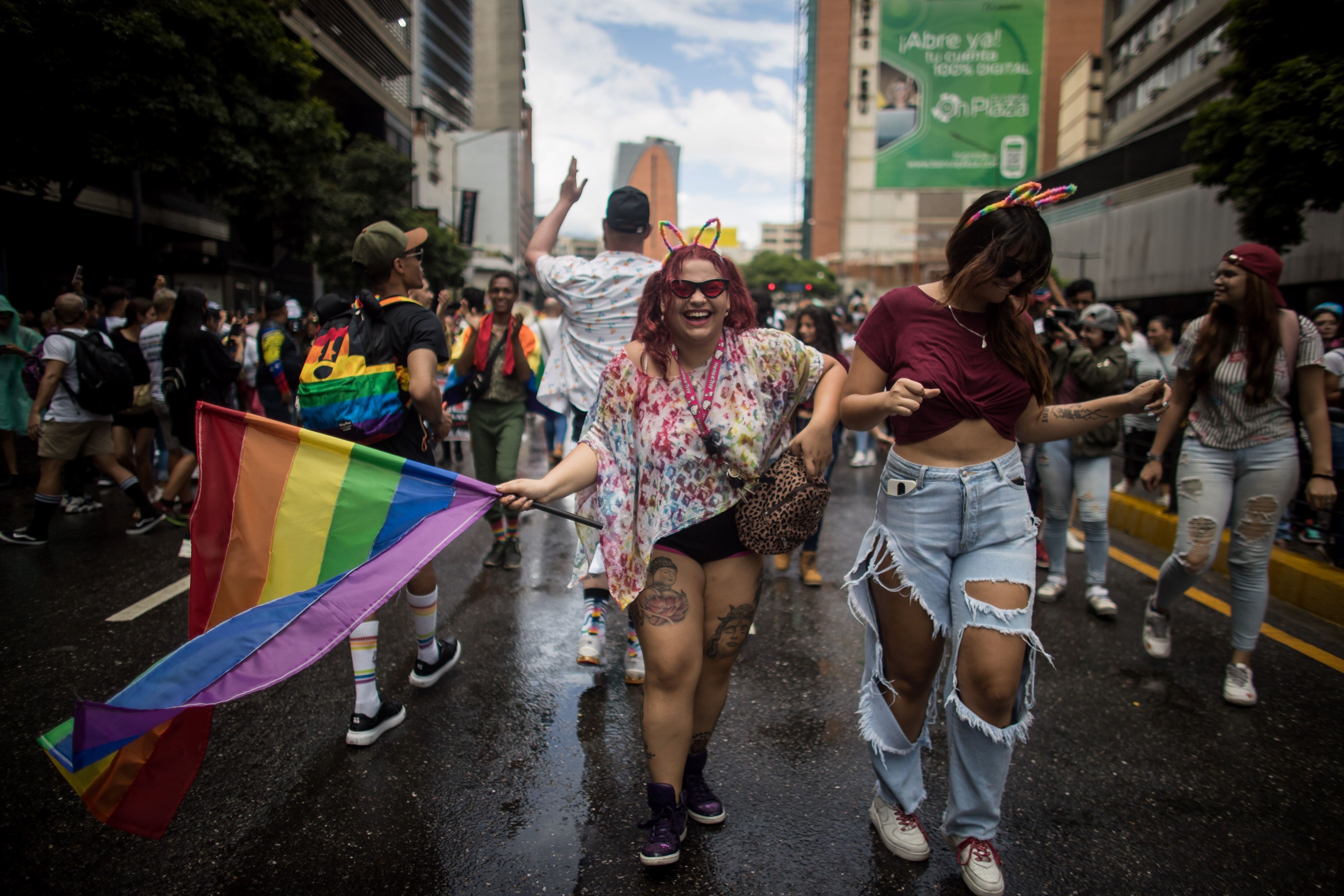Activists, diplomats, mothers, youth, children and even dogs appropriated the colors of the LGBTI+ flag and bathed the streets of Caracas this Sunday in the march called by this group to close the month of Pride in Venezuela.
Thousands of citizens heeded the call and took to the streets on a journey in which they raised their voices to oppose discrimination in Venezuelan society, claim equal rights and accompany the struggles of Venezuelan activism.
Look: Venezuelan activists demand that Nicolás Maduro respect the environment
It was the twenty-first meeting of the group that, this time, proposed a broad invitation that would not only involve one political sector or another, but also set out the basic idea of the event that “There is much more that unites us than divides us”, as the former opposition deputy Tamara Adrián explained to Efe.
“We are giving an example that had not been given before in the country: the organizing committee of this march (…) is an absolutely plural committee in which there are Chavistas, dissident Chavistas, opponents and dissident opponents,” said Adrián, known as the first Venezuelan transsexual deputy.
IN FAMILY
“Free Mommy Hugs”wrote Margi Pulido on a poster with which she traveled several streets from the east and to the center of Caracas.
Together with her daughter, a member of the LGBTI+ community, she gave affection and joy to those who came to read her message and assured that her intention is none other than “support” and show the importance of the family being empathic.
Her daughter, Uziel, a transgender woman, assured Efe that Venezuela lives in a “retrograde” society and that she hopes to be able to “scream, be free” and be who she is without limitations.
Another mother in the march was Adriana Marín, who, accompanied by her minor daughter, toured Caracas with the rainbow flag demanding equality and respect for herself and all her friends.
His only wish is that his daughterbe safe all the time and be happy”, and therefore urged Venezuelan parents to join the fight of lesbian women, gay men, bisexual and trans people.
“We don’t even have a reason to be here, because this shouldn’t exist if we weren’t homophobic and that word didn’t exist, because heterosexuals don’t go out to march to fight for their rights (…) Simply because we are all equal and we must respect each other and that everyone is free to love whoever they want to love”, said Isabel Leal, another mother present at the march.
AGAINST EXCLUSION
Those who participated in the tour recalled that in Venezuela a homosexual man cannot donate blood or a trans woman is condemned to legally identify herself with a name that does not represent her and, thus, a long list of prohibitions.
For this reason, with wigs, glitter and paint, or simply with simple clothes, many marched this Sunday to oppose the absence of these rights and exclusion.
This is the case of Liohan Delgado, a trans woman who assured that being a trans woman in Venezuela represents a high degree of difficulty.
“Being trans in Venezuela is difficult because here the State does not recognize the rights of people like us, there is no response, there is no care, there is no social protection, there is no health, there are no rights in general (…) not even there is a right to identity, so here in Venezuela it is living without rights, living without identity and living without options,” he asserted.

BACK
The head of mission of the Delegation of the European Union (EU) in Venezuela, Rafael Dochao, accompanied the demonstration and assured that the European ambassadors in the country decided to be part of it because it is a festive march, but also “demanding”, for the rights of this community.
“It is essential to think that we are here and we are all in this world in which there is still a lot of discrimination against LGBTIQ+ groups and so we want to launch that loud, strong voice of solidarity on the part of the European Union towards all these groups”, he told the media.
He recalled that more than 70 countries still consider homosexuality a crime and in 12 nations of the world it is sentenced to death, lists in which Venezuela does not appear.
“Venezuela is not there, Venezuela is much more advanced, but in all European, Asian, African or Latin American countries, and in Venezuela, of course, we must continue to advance,” he said.
Source: Elcomercio
I, Ronald Payne, am a journalist and author who dedicated his life to telling the stories that need to be said. I have over 7 years of experience as a reporter and editor, covering everything from politics to business to crime.

:quality(75)/cloudfront-us-east-1.images.arcpublishing.com/elcomercio/5LYLLUQKA5B5XMDVLA5LT2XQDQ.jpg)

:quality(75)/cloudfront-us-east-1.images.arcpublishing.com/elcomercio/TVKWNXBTAFGHBEDSVLZS5OOOKY.jpg)
:quality(75)/cloudfront-us-east-1.images.arcpublishing.com/elcomercio/SH7TJZEDJBHA5KJZGNVJC7IVXE.jpg)
:quality(75)/cloudfront-us-east-1.images.arcpublishing.com/elcomercio/DIWZTVLACFFLBBFI6UIVNLWKMA.jpg)
:quality(75)/cloudfront-us-east-1.images.arcpublishing.com/elcomercio/QB4EKPAJRNFB7JRBBRPJQNWNE4.jpg)
